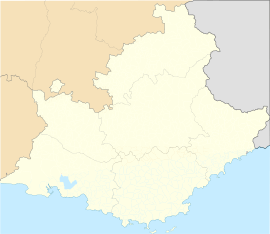Biot, Alpes-Maritimes
| Biot | ||
|---|---|---|
|
The Place des Arcades Biot, in Biot | ||
| ||
 Biot | ||
|
Location within Provence-A.-C.d'A. region  Biot | ||
| Coordinates: 43°37′46″N 7°05′46″E / 43.6294°N 7.0961°ECoordinates: 43°37′46″N 7°05′46″E / 43.6294°N 7.0961°E | ||
| Country | France | |
| Region | Provence-Alpes-Côte d'Azur | |
| Department | Alpes-Maritimes | |
| Arrondissement | Grasse | |
| Canton | Antibes Juan-les-Pins | |
| Intercommunality | Sophia Antipolis | |
| Government | ||
| • Mayor (2008–2014) | Jean-Pierre Dermit | |
| Area1 | 15.54 km2 (6.00 sq mi) | |
| Population (2008)2 | 9,160 | |
| • Density | 590/km2 (1,500/sq mi) | |
| INSEE/Postal code | 06018 / 06410 | |
| Elevation | 9–208 m (30–682 ft) | |
|
1 French Land Register data, which excludes lakes, ponds, glaciers > 1 km² (0.386 sq mi or 247 acres) and river estuaries. 2 Population without double counting: residents of multiple communes (e.g., students and military personnel) only counted once. | ||
Biot is a commune in the Alpes-Maritimes department in the Provence-Alpes-Côte d'Azur region in southeastern France. It is located near Antibes Juan-les-Pins (av. 6 km), between Cannes and Villeneuve-Loubet on the top of a hill overlooking the Mediterranean, about 40 kilometers from Monte Carlo.
Biot was a pottery centre from the beginning of the 16th century until the 18th century. In the middle of the 20th century, Biot once again became famous for its decorative pottery and glasswork.
Biot is well known for its glassblowers and bubble glass products[1] Eloi Monod started the village's glass-blowing tradition. The Fernand Léger museum stands at the foot of the village.
European Heart House, the official headquarters of the European Society of Cardiology, is located within the borders of the commune of Biot.
Toyota ED2 design center is located here. ED2 leads the design of the future Toyota automobiles in Europe and beyond.
History
Once inhabited by Celts, Biot was conquered by the Roman legion two thousand years ago, which remained there for about five hundred years. In 1209 it was a village of Knights Templar who were replaced in 1312 by the Knights of Malta, of which there are several witnesses evidence today.
From 12th to 14th century, remarkable result of original charters from the archives of the Temple, gives us a perfect idea of the "castrum" and the village of Biot. In 1209, the Count Alfonso II of Provence gives to the "Order of the Temple" all his possessions in Biot. The Knights Templar then buy the best land in the country, and founded the castrum, a place that soon will become one of the most important religious institutions of the entire region and a place of pilgrimage due to numerous relics from Jerusalem.
In January 1308, the Count of Provence Charles II of Naples, obeying the instructions of the Pope Clement V, ordered his officers to arrest unfairly all the faithful Knights Templars. Knights Templar in front of the pope will surrender. Many families of knights Templar emigrated to other parts of Europe. All the assets of the Knights Templar are delivered to the Order of Saint John (chartered 1888).
In 1387 the town was destroyed by the war. In 1470 Biotti was repopulated with 50 families emigrated from western Liguria, which became the majority of the population. Even today many residents speak a language unique in the world, the variant "Biot" of Figun.
Population
| Historical population | ||
|---|---|---|
| Year | Pop. | ±% |
| 1968 | 2,656 | — |
| 1975 | 2,745 | +3.4% |
| 1982 | 3,680 | +34.1% |
| 1990 | 5,575 | +51.5% |
| 1999 | 7,395 | +32.6% |
| 2008 | 9,160 | +23.9% |
See also
References
External links
- Official website
- Virtual visit of the old village with fullscreen panoramas
- Fernand Léger Museum
- INSEE
| Wikimedia Commons has media related to Biot, Alpes-Maritimes. |
.svg.png)